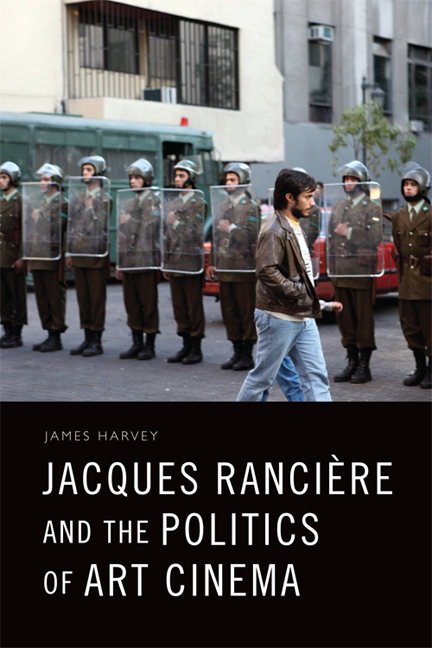Conclusion: Contemporary Political Art Cinema
Published online by Cambridge University Press: 28 April 2021
Summary
Do art films offer more than a mere illustration of some abstract theoretical notions? It will no doubt be hard to convince those with a preference for hard, empirical realities that anything but (at best) a political discussion or portrayal is happening in these films. While I have sought to critique Rancière's own view of cinema as representational only, I have also argued that his political aesthetic theories offer a way of locating politics in and through film. However, Peter Hallward has more roundly criticised Rancière's theories, claiming that the association of politics with aesthetics ‘encourages us to do little more than “play at” politics or equality’ (Hallward 2006b: 128–9). Does Rancière's political theory leave a potential for simply giving up and accepting the way things are? This sentiment is broached directly by Yves Citton:
We, people of the 21st century – aware of all the traps and past failures of political agency, calls to arms and other glorious revolutionary projects (so the postmodern story goes …) – we like it whenever someone suggests that we can be ‘subversive’ by simply sitting there with our eyes open: our hands are unlikely to find themselves covered with blood in the process, we are unlikely to be hurt or jeopardize our (after all fairly comfortable) conditions of living. (Citton 2009: 121)
One should clarify this passage; Citton actually goes on to complicate such a simplistic view of things. Yet, in presenting this perspective in the first place, he articulates an important point that could be levelled at Rancière's work – and certainly my own: how are films – even the most innovative and committed films – worthy of the rare label Rancière names ‘politics’? To claim that politics occurs in and through one of these films goes further even than Rancière's use of films for theorising the political. I shall use this conclusion to summarise why I think the answer is ‘yes’ and to bring together some final thoughts on contemporary political art cinema.
Let us first revisit some important points on the redistributive activity of politics. As I stated in the introduction, Rancière defines politics as the redistribution of the partitions framing a social order, meaning that bodies assigned to one role attain the capacity for escaping that location and taking on another one.
- Type
- Chapter
- Information
- Jacques Rancière and the Politics of Art Cinema , pp. 122 - 133Publisher: Edinburgh University PressPrint publication year: 2018



